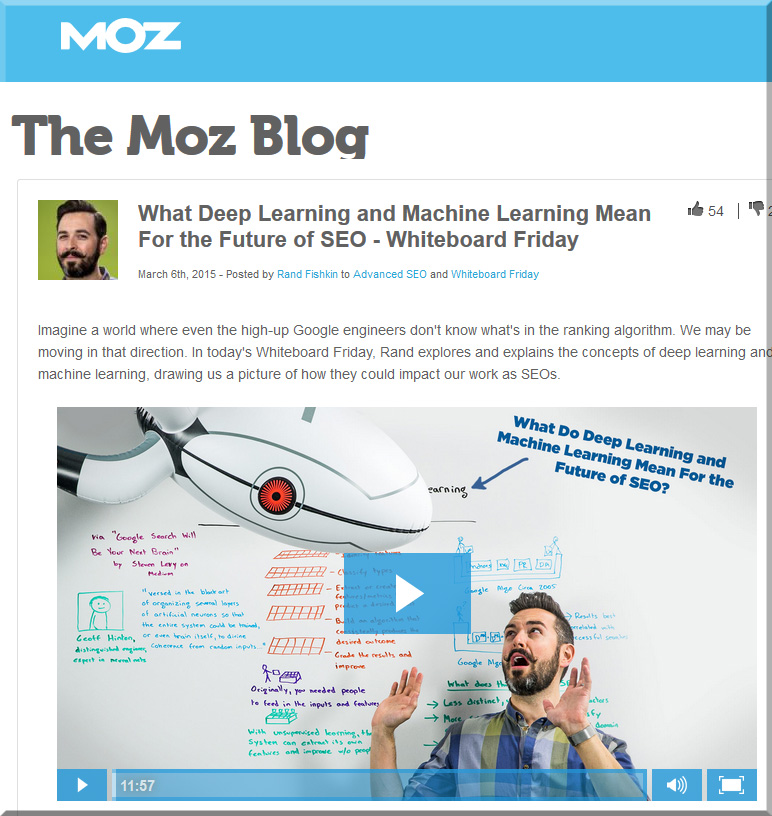Part 3: Google Search will be your next brain — from medium.com by Steven Levy
Inside Google’s massive effort in Deep Learning, which could make already-smart search into scary-smart search
Excerpt:
But about ten years ago, in Hinton’s lab at the University of Toronto, he and some other researchers made a breakthrough that suddenly made neural nets the hottest thing in AI. Not only Google but other companies such as Facebook, Microsoft and IBM began frantically pursuing the relatively minuscule number of computer scientists versed in the black art of organizing several layers of artificial neurons so that the entire system could be trained, or even train itself, to divine coherence from random inputs, much in a way that a newborn learns to organize the data pouring into his or her virgin senses. With this newly effective process, dubbed Deep Learning, some of the long-standing logjams of computation (like being able to see, hear, and be unbeatable at Breakout) would finally be untangled. The age of intelligent computers systems?—?long awaited and long feared?—?would suddenly be breathing down our necks. And Google search would work a whole lot better.
This breakthrough will be crucial in Google Search’s next big step: understanding the real world to make a huge leap in accurately giving users the answers to their questions as well as spontaneously surfacing information to satisfy their needs. To keep search vital, Google must get even smarter.
This is very much in character for the Internet giant. From its earliest days, the company’s founders have been explicit that Google is an artificial intelligence company. It uses its AI not just in search?—?though its search engine is positively drenched with artificial intelligence techniques?—?but in its advertising systems, its self-driving cars, and its plans to put nanoparticles in the human bloodstream for early disease detection.
…
Indeed, as of now, all Google’s deep learning work has yet to make a big mark on Google search or other products. But that’s about to change.
Also see the other parts in this series:
Part 1: The never ending search
Excerpt:
Google’s flagship product has been part of our lives for so long that we take it for granted. But Google doesn’t. Part One of a study of Search’s quiet transformation.
Part 2: How Google knows what you want to know
Eight times a day Google asks test subjects about their information needs. Their replies can be sobering.
Excerpt:
Google search really isn’t threatened by competition from other search engines. But the people on the search team constantly worry that they may be falling short in satisfying the needs of their users. To address that problem, of course, Google needs to know what those needs are. One way to do this is by examining the logs to see what queries are unsatisfied. But there are lots of things people want to know that they aren’t asking Google about.
How does Google know what those needs are?
It asks them.
Every year since 2011 Google has run an annual study to learn what people really, really want to know, whether it’s something Google provides or not. It’s called Daily Information Needs, but the psychologists at Google involved with the project just call it DIN.
Part 4: The Deep Mind of Demis Hassabis — from medium.com by Steven Levy
Google’s prize AI prodigy tells all. In the race to recruit the best AI talent, Google scored a coup by getting the team led by a former video game guru and chess prodigy
Excerpt:
From the day in 2011 that Demis Hassabis co-founded DeepMind—with funding by the likes of Elon Musk—the UK-based artificial intelligence startup became the most coveted target of major tech companies. In June 2014, Hassabis and his co-founders, Shane Legg and Mustafa Suleyman, agreed to Google’s purchase offer of $400 million. Late last year, Hassabis sat down with Backchannel to discuss why his team went with Google—and why DeepMind is uniquely poised to push the frontiers of AI. The interview has been edited for length and clarity.
Addendum on 3/16/15:









